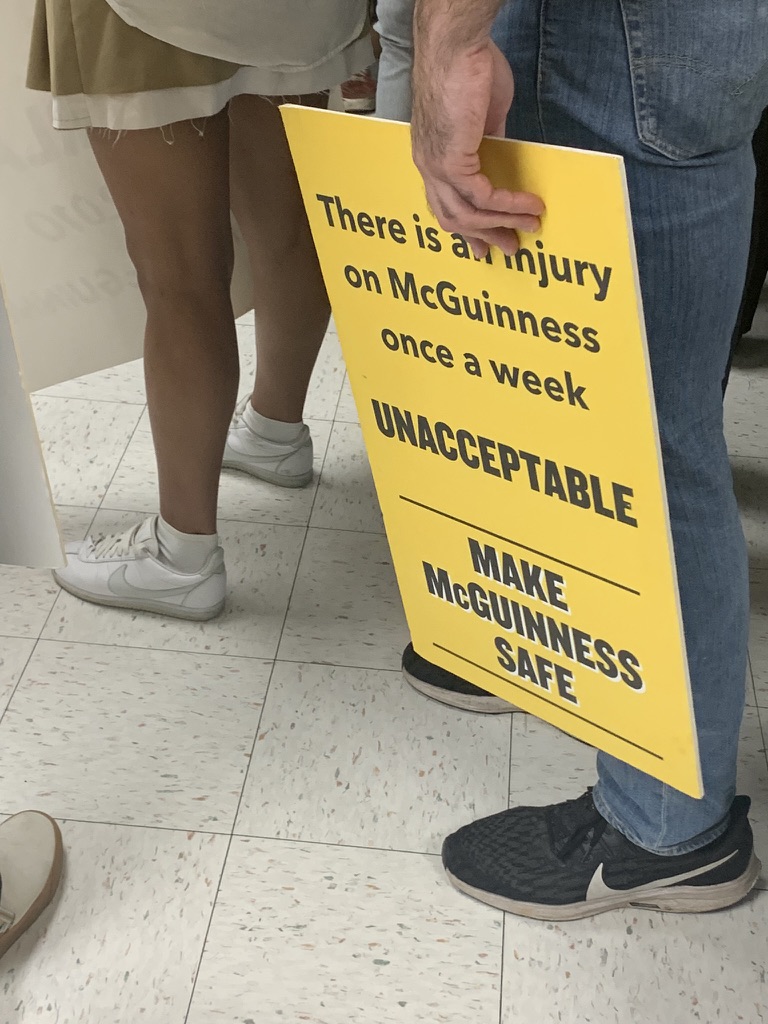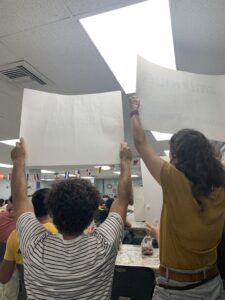In early September, construction work commenced on the redesign of McGuinness Boulevard in Greenpoint. This redesign project has ignited a contentious debate between two opposing groups: “Make McGuinness Safe” and “Keep McGuinness Moving.” Both groups persist in expressing their dissatisfaction with the redesign’s decision-making.
McGuinness Boulevard runs between Interstate 278 in the south and the Pulaski Bridge in the north in Brooklyn. In the past 10 years, three individuals have lost their lives in accidents on the boulevard. The most recent incident was the hit-and-run death of a local schoolteacher, Matthew Jensen, in 2021. This tragic event prompted the Department of Transportation (DOT) to initiate research aimed at finding an appropriate redesign solution to enhance the safety of McGuinness Boulevard.
In May of this year, the DOT presented three potential redesign proposals, referred to as plans A, B, and C. Plan B, which involves a full “road diet,” with one lane removed in each direction on McGuinness to make space for a bike lane, was the most preferred design concept. However, in response to Mayor Adams’ request for a review of the initial redesign plan, the current work on McGuinness is now based on a compromise plan.

“There was well-funded opposition from Broadway Stages and this group Keep McGuinness Moving to push back,” said Kevin LaCherra, an activist with Make McGuinness Safe, a group that supports the road diet. He then added, “what happened from there was there was community division back and forth, and the city went ahead and said okay we’re going to do a compromise, and that compromise was plan A in northern 30% and plan C in the southern 70%.”
“It’s been this subversion of this democratic scripted process,” said Bronwyn Breitner, the lead coordinator with Make McGuinness Safe. The democratic process that Ms. Breitner refers to encompassed two years of community board meetings, through which discussions and votes were held on the redesign of McGuinness Boulevard.
In response to claims that a road diet redesign was the democratically chosen option by the community, Monica Holowacz, an activist with Keep McGuinness Moving, stated, “I could say it a million times, but I feel like the community outreach wasn’t proper.”
Averianna Eisenbach, the founder of Keep McGuinness Moving, explained that the group opposes the road diet because, “Tens of thousands of vehicles would be diverted onto local, quiet and residential side streets, and the DOT admitted this.”
“What they are catastrophizing about is not a real problem, and the DOT has studied that, and they have found that,” said Mr. LaCherra.
The official McGuinness Boulevard Redesign Proposal, presented by DOT on May 4, 2023, acknowledged that implementing plan B would likely result in an “increase in traffic delays and travel time for private vehicles on McGuinness Boulevard during an initial adjustment period.” However, the opposing groups interpret the DOT’s proposal differently.
“If I have to honestly say what I think this is, this is a fight that Greenpoint as a neighborhood has heard and engaged in before [against] a selfish corporation putting their interests ahead of the health and wellbeing of the people,” said Mr LaCherra, referring once again to Broadway Stages, the film and television studio production company that is headquartered in Greenpoint.
The group Make McGuinness Safe asserts that donations from the CEO of Broadway Stages, Gina Argento, to Mayor Adams’ campaign have influenced the decision-making process regarding McGuinness Boulevard. “They’re used to getting prioritized as a default,” said Mr. LaCherra. “If they’re not the default priority, they’re willing to pay a lot of money to make themselves the default priority, and that’s not right, that’s not democracy, that’s not the [function of the] government, and it’s wrong.”
Broadway Stages has not denied making donations to the mayor’s campaign. “Broadway Stages and its founders have given philanthropically and politically for decades to groups and individuals who they believe represent the best of New York,” said Juda Engelmayer, a PR representative for the company. “It’s a small-minded idea to target and call out people because you think it might be advantageous to your cause.”
“Nobody likes conflict that is immensely difficult, but at the same time we have to stand up for what is right, we have to speak the truth, and we cannot let a process, a democratic process, be hijacked for one company and one individual’s profits,” said Mr. LaCherra, justifying why Make McGuinness Safe activists mention Broadway Stages when discussing their cause.
“Broadway Stages is a local business, and they are allowed to have a say in what goes on in the community, just like every other resident and business in Greenpoint,” Ms. Eisenbach from Keep McGuinness Moving said in response.
Despite a common belief between the opposing groups that McGuinness Boulevard should be safer, the disagreement between the Make McGuinness Safe and Keep McGuinness Moving activists persists. However, both groups can agree on one thing: the compromise redesign currently underway on the boulevard is not what they desire.

“I think the compromise plan compromises the safety of the residents of the neighborhood,” said Mr. LaCherra on the position of Make McGuinness Safe, while Ms. Eisenbach stated that her group is “extremely disappointed with the DOT intentionally steamrolling this plan onto our community without any notice, despite them knowing that Greenpoint is fully against it.”
Meanwhile, the DOT has already announced that they will complete the work following the compromise plan on the northern half of the road by the end of the year.







